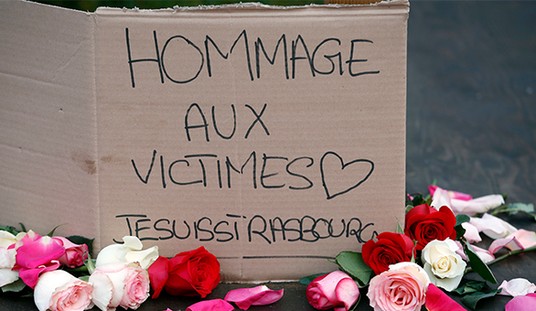Sergeant Anthony Diaz has been stationed in Baghdad since August, at about the time when the violence levels started consistently dropping throughout Iraq. He arrived a month before Hillary Clinton implied that his commander lied to Congress when testifying to the improvements that had already been made, and he remains in Iraq while they continue. Despite a national media that focuses only on the latest bombing, Diaz writes in the Washington Post that the surge has succeeded in giving Iraq a strong momentum for peace and democracy:
Since I arrived here last August, I have been struck by four things: the financial commitment we have made to reconstruction; the precipitous decline in violence; the inklings of representative government; and the small yet significant progress in communal relations between the mostly Shiite Iraqi army and the predominantly Sunni residents of this area. One often reads of the chaos plaguing Iraq. Yet the media accounts only infrequently seem to grasp the successes being achieved. …
The troop surge has contributed more soldiers to this small but critical area of Baghdad. But the building of the Adhamiyah wall, coupled with the sea change in the population’s attitude toward the coalition, also contributed greatly to the decline in violence. And our squadron’s ability to capitalize on these changes has been equally powerful. Building a local security force has been a slow, painful process. The people’s change in attitude toward the coalition has led to more citizens providing soldiers with information on crime suspects and potential locations of roadside explosives and weapons caches. All these things have shaped the successes we are seeing daily.
Late last year, I witnessed something inspirational in a rather unlikely setting: an ordinary neighborhood advisory council meeting. Attendance was the highest I had yet seen, with about 40 prominent locals present. The coalition was represented by our squadron commander, a few colonels from the embedded provincial reconstruction team and a political officer from the U.S. Embassy. Discussions ranged from the persistent lack of electricity to sewage problems to economic development. What struck me were the comments of some Sunni workers from the district’s power station, who came to complain that the (mostly Shiite) Iraqi army had mistreated them and accused them of distorting the distribution of electric power, something over which these workers have little control. The men said they would strike until they received better treatment and pleaded with the council chairman, a Sunni, for help. That was an unlikely outcome, given the entrenched animosity between Shiites and Sunnis and the lack of substantive political reconciliation even at the highest levels of government here. But these men did something many Americans would take for granted: They voiced grievances and sought assistance. These are the seeds of representative government, citizens coming forth and demanding change from their representatives. Much work remains to be done, but we have clearly made a start.
On one hand, the media coverage of Iraq has left a lot to be desired. Instead of embedding with troops, the traditional media outlets have either chosen to remain in the Green Zone and to rely on stringers for their reporting, or they have (rarely) run terrible risks by venturing out on their own for independent reporting. When doing the former, they wind up giving only the most superficial, if-it-bleeds-it-leads type of reporting, and in the latter, several have died or been kidnapped and terrorized, as in the case of Jill Carroll. Only a few will embed and get access to the real story of Iraq, and even then, the mainstream media outlets mostly ignore Michael Yon and Michael Totten.
Yet the troops themselves have had a historical opportunity to become war correspondents in the media, and the Washington Post should be commended for giving Sgt. Diaz that platform, live from the front. Milbloggers have carved out an entire media niche that allows those interested to find the information on what happens in Iraq besides the car bombs on which terrorists know the American media focus. No war in history has had this kind of direct access to a wide audience for the men and women fighting the war.
For this reason, we know that General David Petraeus wasn’t the one lying last September when he told Congress that Iraq was improving significantly. The anti-war activist lies about Iraq and the troops can get challenged — as can overly rosy assessments from the war’s supporters. Sgt. Diaz doesn’t write that Iraq has somehow transformed into Shangri-La or the Age of Aquarius has arrived in Baghdad; he knows that much work lies ahead to secure the gains already made. But he understands that this mission cannot be won on a politician’s timetable, and that we need to take heart that we have turned the corner and will succeed in this mission if we don’t quit on it first.








Join the conversation as a VIP Member